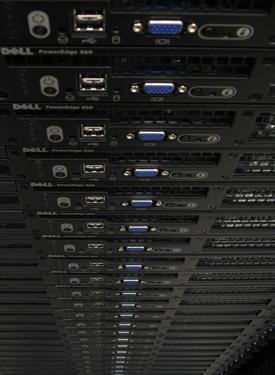This course is no longer taught at the U-M School of Information. These materials are from an older iteration of the course.
Records are the corporate and cultural memory that provide proof of actions and decisions, build a knowledge-base for reflection and learning, and form a perspective on today's society that we will pass on to future generations. As organizations create and maintain more of their records electronically, they are struggling to develop effective policies, systems, and practices to capture, maintain, and preserve electronic records.
This course examines the ways in which new information technologies challenge organizations' capacities to define, identify, control, manage, and preserve electronic records. Students learn how different organizational, technological, regulatory, and cultural factors affect the strategies, practices, and tools that organizations can employ to manage electronic records. Problems of long-term preservation and continuing access to electronic records are analyzed and addressed. Addresses electronic records management issues in a wide variety of settings, including archives and manuscript repositories.
Instructors: David A. Wallace and Margaret Hedstrom
dScribe: Chris Zbrozek
Course Level: Graduate
Course Structure: Three hour lecture - once a week
Syllabus
Overview
Records are the corporate and cultural memory that provide proof of actions and decisions, build a knowledge-base for reflection and learning, and form a perspective on today's society that we will pass on to future generations. As organizations create and maintain more of their records electronically, they are struggling to develop effective policies, systems, and practices to capture, maintain, and preserve electronic records.
This course examines the ways in which new information technologies challenge organizations' capacities to define, identify, control, manage, and preserve electronic records. Students learn how different organizational, technological, regulatory, and cultural factors affect the strategies, practices, and tools that organizations can employ to manage electronic records. Problems of long-term preservation and continuing access to electronic records are analyzed and addressed.
An accumulating series of organizational and institutional breakdowns across sectors implicate electronic records and provides the opportunity for a concentrated focus on Records and Accountability. Failures of accountability in private corporations (ENRON, etc.); governments (Iraq reconstruction, etc.); and international organizations (the UN Oil for Food Program, etc.) are ushering in important reforms that require a heightened awareness of the infrastructure for accountability and the significant role of authentic, reliable, and accessible records for these reforms to work effectively. The course will pay particular attention to the social, legal, and policy requirements for records and recordkeeping to support accountability. It will provide students with knowledge and skills to investigate recordkeeping requirements, to identify options for implementing such requirements, and to lead efforts to introduce accountability frameworks in a wide variety of organizations.
Course Objectives
This course introduces students to the conceptual, legal, social, and cultural issues and practical problems of managing electronic records and record keeping systems. It builds upon basic methods of records management and information resource management. It acquaints students with techniques for ensuring that electronic records are captured, preserved and usable over time.
The course will provide students with:
- Familiarity with the role of electronic records in accountability and sensitivity to what can go wrong if recordkeeping systems are inadequate or fail.
- Knowledge of the legal, administrative, and financial issues related to electronic records and recordkeeping.
- Awareness of standards and best practices for creation, retention, authenticity, security, and accessibility of electronic records.
- Familiarity with systems, technologies, and tools that support electronic records management, and knowledge of criteria to evaluate their effectiveness.
- An understanding of the institutional variables (e.g., corporate culture, business activities, and information technology environments) that affect the implementation of recordkeeping and accountability requirements.
- Skills in evaluating information systems for compliance with recordkeeping and accountability requirements.
Assignments
Most classes will consist of a lecture followed by a class discussion. Students are expected to read the required readings for each class, be prepared to discuss the issues they address, and raise questions pertaining to their content. Note: Active (and informed) participation in class discussions constitutes 20% of your grade. You are encouraged to question the assumptions of the readings, your instructor, and your fellow students. Ideas are presented in order for you to analyze and critique them.
Active Participation in Class Sessions. Students are expected to complete all readings, provide insights, raise questions and issues for clarification, and participate actively in the class sessions (20%).
Short Essay: Philip Bantin in “Electronic Records Management: A Review of the Work of a Decade and a Reflection of Future Directions” (assigned Week 1 January 12) outlines many of the important debates among archivists and records managers about electronic records during the 1990s. After reading this article thoroughly, select one issue and write a short 5-page essay that summarizes the debates (in your own words) and presents your own position on the issue. Note: For each issue, Bantin cites many other articles and reports. Please locate and read at least three of the sources that he cites (and that are not assigned readings for this course) to build your own position on the issue. Some of these sources are available online, but you will have to use the library to find many of them. Due: Week 3 (February 2) (15%).
Midterm Exam: (Take Home). Around the midpoint of the course we will have covered the generic issues and general best practices for electronic records management. The take home mid-term will evaluate your understanding of these issues and practices. The take home exam will be composed of two essays totaling approx. 8-10 pages. Distributed Week 6 (March 2). Due Week 7 (March 9) (20%).
Problem Solving Exercise: You will receive examples of the three types of problems confronting decision makers in regards to electronic records management. You will develop and submit a 5-7 page proposed solution to a problem of your choice. Assigned Week 8 (March 16). Due Week 11 (April 6) (15%).
Course Project: We are blessed with countless scandals, legal cases, and allegations that revolve around improper management of records and information. Select a case from the list below (or identify your own issue – with instructor approval).
Conduct your own investigation into
- the relevant environment for accountability and
- the laws, rules, regulations, and/or policies that were broken or are alleged to have been broken.
Then summarize the consequences of inadequate recordkeeping for
- the principals directly involved in the case,
- victims of the failure of recordkeeping systems, and
- the public at large.
Finally, identify recordkeeping policies, technologies, tools, and best practices that, if implemented, would have prevented or minimized the damage. Approximately 15 pages. Due Week 13 (April 20) (30%, 1 PEP point for pre-Fall 2007 SI admits).
List of Candidate Cases:
- Enron accounting scandal
- Worldcom accounting scandal
- HealthSouth accounting scandal
- Valerie Plame identity leak
- UN Oil-for-Food Program
- Red Cross governance, accounting, and compensation policies
- FEMA accounting for hurricane relief
- Afghanistan/Iraq Contracts
- Tom Delay Indictment
- Vioxx and other pharmaceutical lawsuits
- Election/Voter Fraud [pick (almost) any country and (almost) any election]
- Choicepoint (inappropriate release of personal information).
- Jack Abramoff scandal
- FBI’s Virtual Case File
- Missing White House email
General Resources The Resources section of the CTools Site has a folder called “Useful Websites and Resources.” Use this to find additional information and reference materials. Feel free to suggest additional resources.
Grading
20% Active Participation in Class Sessions
15% Short Essay
20% Midterm Exam (take home)
15% Problem Solving Exercise
30% Course Project
Learning Objectives
This course introduces students to the conceptual, legal, social, and cultural issues and practical problems of managing electronic records and record keeping systems. It builds upon basic methods of records management and information resource management. It acquaints students with techniques for ensuring that electronic records are captured, preserved and usable over time.
The course will provide students with:
- Familiarity with the role of electronic records in accountability and sensitivity to what can go wrong if recordkeeping systems are inadequate or fail.
- Knowledge of the legal, administrative, and financial issues related to electronic records and recordkeeping.
- Awareness of standards and best practices for creation, retention, authenticity, security, and accessibility of electronic records.
- Familiarity with systems, technologies, and tools that support electronic records management, and knowledge of criteria to evaluate their effectiveness.
- An understanding of the institutional variables (e.g., corporate culture, business activities, and information technology environments) that affect the implementation of recordkeeping and accountability requirements.
- Skills in evaluating information systems for compliance with recordkeeping and accountability requirements.
About the Creators

David A. Wallace
David A. Wallace is a lecturer IV at the University of Michigan School of Information. Wallace's major areas of research include investigations into the connections between archiving and the shaping of the present and the past; the role of archives in enabling and denying accountability and justice; and computerization of government records.
Wallace had taught at the School of Information from fall 1997 through the winter 2004 term. He then became a visiting faculty member at Catholic University of America in Washington, D.C.
Since 1994 he has authored more than 45 publications and given over 50 presentations at professional forums on recordkeeping and accountability; freedom of information; government secrecy; professional ethics; electronic records management; graduation archival education; information infrastructures; and, cultural heritage on the Web.
He is co-editor of Archives and the Public Good: Accountability and Records in Modern Society (Westport, Connecticut: Quorum Books, 2002), and served as the series technical editor to the National Security Archive's The Making of U.S. Policy series (Chadwyck-Healy & National Security Archive, 1989-1992). In 2001 he received ARMA International's Britt Literary Award for best article in the peer-reviewed Information Management Journal.
Wallace has consulted widely, including associations with the Nelson Mandela Foundation's Centre of Memory; the South Africa History Archive; and Computer Professionals for Social Responsibility.
- Ph.D., University of Pittsburgh
- MLS, State University of New York-Albany
- BA, State University of New York-Binghamton

Margaret Hedstrom
Margaret Hedstrom is associate dean for academic programs and a professor in the School of Information. Before joining the U-M faculty in 1995, Hedstrom was chief of state records advisory services and director of the Center for Electronic Records at the New York State Archives and Records Administration (1985-95).
In fall 2003, she was an author of "It's About Time: Research Challenges in Digital Archiving and Long-Term Preservation," sponsored by the Digital Government Research Program and the Digital Libraries Program Directorate for Computing and Information Sciences and Engineering at the National Science Foundation (NSF) and the Library of Congress National Digital Information Infrastructure and Preservation Program. The other report was "Invest to Save (PDF)," a report and recommendations of the Working Group on Digital Archiving and Preservation, sponsored by the NSF and the European Union.
She also headed the CAMiLEON project with the University of Leeds. In that project, researchers were devoted to the use of emulation tools as part of a strategy for long-term preservation of digital records. CAMiLEON stood for Creative Archiving at Michigan and Leeds: Emulating the Old on the New.
Other major professional accomplishments have included heading the SI research team that assembled the archives of the African National Congress at the University of For Hare's National Heritage Cultural Studies Centre in South Africa.
- Ph.D. in history, University of Wisconsin
- MS in library science and MA in history
- BA, Grinnell College
Jump to:
| Document Title | Creator | Downloads | License |
|---|---|---|---|
|
Syllabus |
David A. Wallace
Margaret Hedstrom
|
| Document Title | Creator | Downloads | License |
|---|---|---|---|
|
Week 01: Introduction, Course Logistics, Key Concepts |
David A. Wallace
Margaret Hedstrom
|
||
|
Week 02: Recordkeeping Requirements in Law, Policy, and Practice |
David A. Wallace
Margaret Hedstrom
|
||
|
Week 03: Trust in Records and Recordkeeping Systems |
David A. Wallace
Margaret Hedstrom
|
||
|
Week 04: Evidence, Discovery, and Admissibility |
David A. Wallace
Margaret Hedstrom
|
||
|
Week 05: Promoting Accountability: Standards and Best Practices |
David A. Wallace
Margaret Hedstrom
|
||
|
Week 06: Promoting Accountability: Tools and Technology |
David A. Wallace
Margaret Hedstrom
|
||
|
Week 07: Promoting Accountability: Compliance and Audit |
David A. Wallace
Margaret Hedstrom
|
||
|
Week 08: Promoting Accountability: Social Demands and Incentives for Accountability |
David A. Wallace
Margaret Hedstrom
|
||
|
Week 09: Sorting Out Contradictions: Freedom of Information, Privacy, Security, and Accountability |
David A. Wallace
Margaret Hedstrom
|
||
|
Week 10: Electronic Recordkeeping Environments: Government; International Organizations and Human Rights |
David A. Wallace
Margaret Hedstrom
|
||
|
Week 11: Records and Accountability Environments: Corporate Sector |
David A. Wallace
Margaret Hedstrom
|
||
|
Week 12: Records and Accountability Environments: Healthcare Sector |
David A. Wallace
Margaret Hedstrom
|
||
|
Week 13: Wrap Up: Towards Transparency, Accountability, and Governance |
David A. Wallace
Margaret Hedstrom
|
| Document Title | Creator | Downloads | License |
|---|---|---|---|
|
Course/Resource Archive in Institutional Repository (October 2010) |
David A. Wallace
Margaret Hedstrom
|
Jump to:
| Document Title | Creator | Downloads | License |
|---|---|---|---|
|
Week 01: Introduction, Course Logistics, Key Concepts |
David A. Wallace
Margaret Hedstrom
|
| Document Title | Creator | Downloads | License |
|---|---|---|---|
|
Week 02: Recordkeeping Requirements in Law, Policy, and Practice |
David A. Wallace
Margaret Hedstrom
|
| Document Title | Creator | Downloads | License |
|---|---|---|---|
|
Week 03: Trust in Records and Recordkeeping Systems |
David A. Wallace
Margaret Hedstrom
|
| Document Title | Creator | Downloads | License |
|---|---|---|---|
|
Week 04: Evidence, Discovery, and Admissibility |
David A. Wallace
Margaret Hedstrom
|
| Document Title | Creator | Downloads | License |
|---|---|---|---|
|
Week 05: Promoting Accountability: Standards and Best Practices |
David A. Wallace
Margaret Hedstrom
|
| Document Title | Creator | Downloads | License |
|---|---|---|---|
|
Week 06: Promoting Accountability: Tools and Technology |
David A. Wallace
Margaret Hedstrom
|
| Document Title | Creator | Downloads | License |
|---|---|---|---|
|
Week 07: Promoting Accountability: Compliance and Audit |
David A. Wallace
Margaret Hedstrom
|
| Document Title | Creator | Downloads | License |
|---|---|---|---|
|
Week 08: Promoting Accountability: Social Demands and Incentives for Accountability |
David A. Wallace
Margaret Hedstrom
|
| Document Title | Creator | Downloads | License |
|---|---|---|---|
|
Week 09: Sorting Out Contradictions: Freedom of Information, Privacy, Security, and Accountability |
David A. Wallace
Margaret Hedstrom
|
| Document Title | Creator | Downloads | License |
|---|---|---|---|
|
Week 10: Electronic Recordkeeping Environments: Government; International Organizations and Human Rights |
David A. Wallace
Margaret Hedstrom
|
| Document Title | Creator | Downloads | License |
|---|---|---|---|
|
Week 11: Records and Accountability Environments: Corporate Sector |
David A. Wallace
Margaret Hedstrom
|
| Document Title | Creator | Downloads | License |
|---|---|---|---|
|
Week 12: Records and Accountability Environments: Healthcare Sector |
David A. Wallace
Margaret Hedstrom
|
| Document Title | Creator | Downloads | License |
|---|---|---|---|
|
Week 13: Wrap Up: Towards Transparency, Accountability, and Governance |
David A. Wallace
Margaret Hedstrom
|




